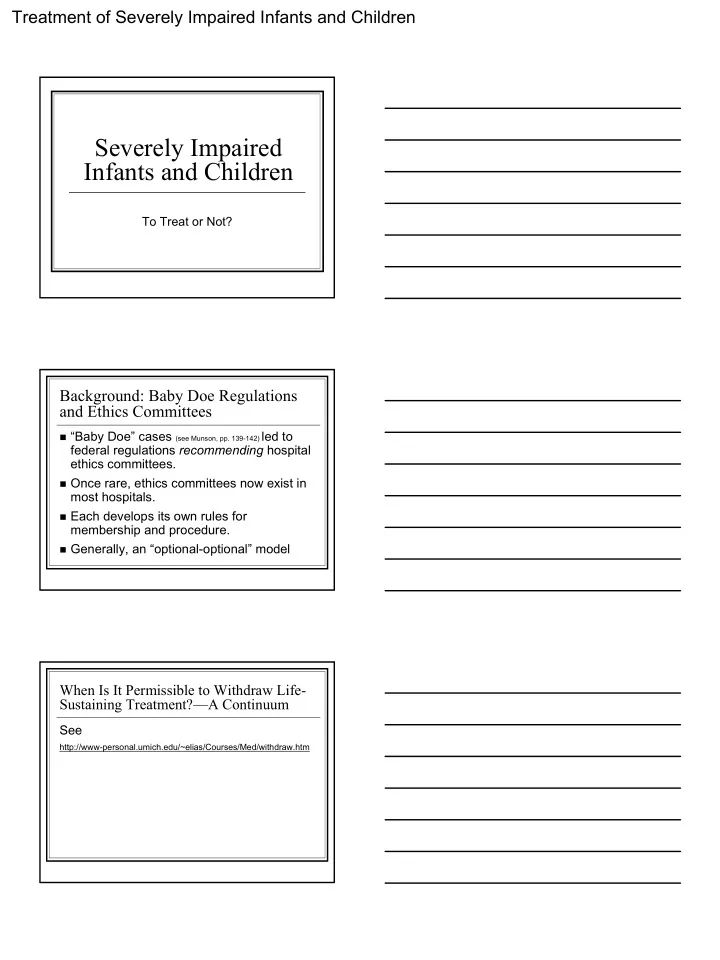

Treatment of Severely Impaired Infants and Children Severely Impaired Infants and Children To Treat or Not? Background: Baby Doe Regulations and Ethics Committees � “Baby Doe” cases (see Munson, pp. 139-142) led to federal regulations recommending hospital ethics committees. � Once rare, ethics committees now exist in most hospitals. � Each develops its own rules for membership and procedure. � Generally, an “optional-optional” model When Is It Permissible to Withdraw Life- Sustaining Treatment?—A Continuum See http://www-personal.umich.edu/~elias/Courses/Med/withdraw.htm Medical Ethics 1
Treatment of Severely Impaired Infants and Children Two Key Questions � What do we consider, rationally, the right thing to do? � Who should decide? � Specifically, how much weight should be given to the views of parents? � Do they have a right of autonomy to act for their child? Robertson and Engelhardt Clash on Key Issues � Are defective infants full persons with right to life? � Is it morally permissible (maybe even obligatory) to stop life-sustaining treatment for the sake of the child? � Is it morally permissible to stop treatment for the sake of others ; e.g., family? � Is it morally permissible to stop treatment because costs are too great? Robertson Responds to These Arguments for Non-Treatment � Infants are not persons � Non-treatment may be appropriate for the sake of the child to avoid a life worse than death � Non-treatment may be appropriate for the sake of others (or costs) Medical Ethics 2
Treatment of Severely Impaired Infants and Children “Infants Are Not Persons” Robertson’s Response � Infants must be considered persons. (Is Robertson’s argument completely nonconsequentialist, as one would expect?) � Robertson opposes Tooley’s argument � To have a right to life one must have a desire to continue to exist � To have a desire to continue to exist, one must have the a sense of self over time � Tooley: since early infants lack this, they are not persons with a right to life “No Obligation to Treat When Infant’s Own Life Would Be Terrible”—Robertson’s Response � Robertson: Even impaired life better than often portrayed � Robertson: nearly impossible for someone else to judge that infant’s life not worth living � What about grossly deformed, retarded, institutionalized child with incessant pain “where continued life is itself torture”? See Robertson’s response, p. 155-2. “No Obligation to Treat When Burden On Others Is Too Great” –Robertson’s Response � Families can be helped so that burden not overwhelming and even some benefit � Health professionals’ problems are significant but comparatively minor � Costs to society � Questions the cost-benefit calculations of others � Saving money doesn’t justify violating rights. Medical Ethics 3
Treatment of Severely Impaired Infants and Children Engelhardt: Parents May Decide Not to Treat in Many Cases � Children are not persons in full sense � Nontreatment justified if either � Quality of life will be very poor � Costs (financial, psychological) great � The decision is one for parents � Exception: children should be protected from parental decision not to treat if child can have good quality of life and not a severe burden (p.160-2) Engelhardt: May Even Be an Obligation Not to Treat � In some cases continued existence is an injury for the child � Legal idea developing of child suing for “wrongful life.” � Is there a parallel ethical idea that we should accept? Now: You Be an Ethics Committee � What follows is an actual case (disguised to preserve confidentiality), one of the most memorable in the history of the University of Michigan Health System’s Pediatric Ethics Committee. � You decide. Medical Ethics 4
Treatment of Severely Impaired Infants and Children Kenny – Medical Information � Age: four years � Spinal muscular atrophy � Has lost previous crawling and walking abilities � Needs a body jacket for support and a by-path assist device to aid in breathing � Independent in a wheelchair, but dependent in bathing and dressing � Problems chewing, mild scoliosis, contractures of his legs, easily-managed constipation and tremors � Active and mentally precocious child Prognosis � Expected to become weaker with inability to swallow and handle secretions � Will eventually require nasogastric tube or gastrostomy for feeding � Will eventually die of his disease; the likelihood of prolonged survival appears to be quite limited What the Treatment Team Said � Tracheostomy and ventilator support recommended at this time to eliminate choking and breathing crises disturbing Kenny's sleep � Tracheostomy may slow deterioration since his breathing problems may aggravate the weakness associated with his disease Medical Ethics 5
Treatment of Severely Impaired Infants and Children What the Family Said � Parents no longer have hope of a cure for Kenny � Parents have done research and talked with parents of ventilator dependent children. � They believe that life immobilized and sustained by a ventilator would not be an acceptable quality life for Kenny. � Kenny said he does not want a hole in his throat and that he wants to be left alone � Five-year-old sister experiences trauma coping with her brother's illness What are the Key Ethical Issues? Slides in class will outline these and, after our discussion and recommendation, present the actual committee’s recommendation and rationale. Medical Ethics 6
Recommend
More recommend